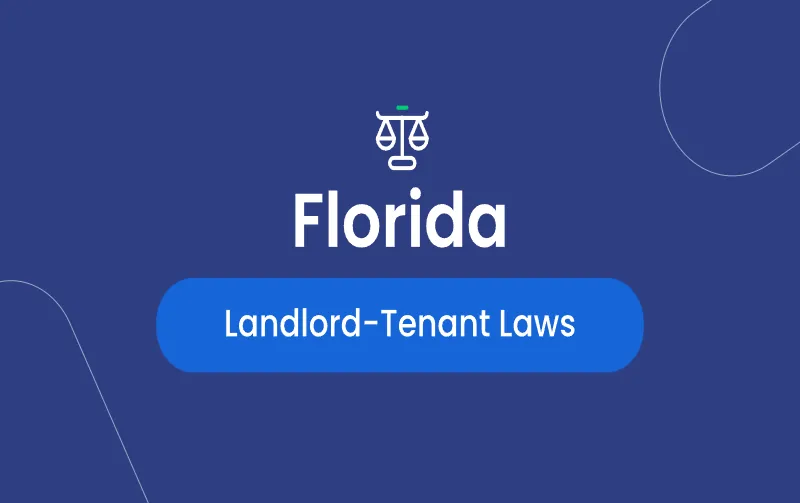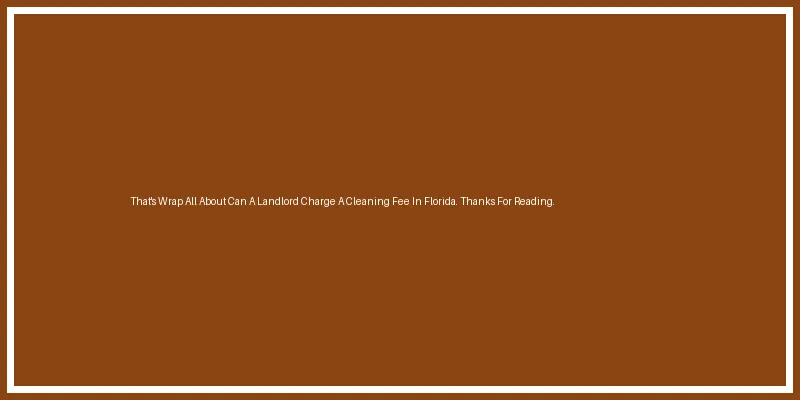In Florida, a landlord can charge a cleaning fee if it is explicitly stated in the lease agreement and agreed upon by the tenant.

Understanding Florida’s Rental Laws on Cleaning Fees
Definition of a Cleaning Fee in Rental Agreements
A cleaning fee is a charge that a landlord might put in a rental agreement. It’s for cleaning the property after you move out.
This fee is not for little messes but for a big clean-up. It makes sure the next person finds the home nice and tidy.
In Florida, these fees have to be fair, and you should know about them before you sign the lease.
Florida Statutes Relevant to Landlord Charges
In Florida, the law says landlords have rules to follow when they charge extra money.
These rules are in the Florida Statutes, and they help make everything clear and fair.
They say what a landlord can and cannot do about fees like the cleaning fee. Knowing these rules can help you understand what’s okay and what’s not.
Legal Boundaries for Landlords Charging Additional Fees
Landlords in Florida can’t just charge any fee they want. The law sets limits to keep things fair.
A cleaning fee should match the actual cleaning costs. Landlords should not use these fees to make extra money.
If a fee seems too high, it might not be allowed. It’s important to know these legal boundaries.
Cleaning Fee vs. Security Deposit Distinctions
A cleaning fee and a security deposit are not the same. A security deposit is money you give to your landlord before you move in.
It’s like a safety net for them in case of damage or unpaid rent. A cleaning fee is specifically for cleaning after you leave. You should not confuse these two things.
Required Disclosures about Cleaning Fees in Leases
When you sign a lease, your landlord should tell you if there’s a cleaning fee. This information must be clear and easy to find in the agreement.
If it’s hidden or not mentioned, the landlord might not be able to charge you later. Always look for this disclosure before you sign.
Tenant’s Right to a Clean Property Upon Move-In
When you move into a new place, it should be clean. This is your right as a tenant. If the property is dirty, you can talk to your landlord about it.
They should make sure it’s clean before you move in. This sets a good standard for how the place should look when you move out.
Circumstances Under Which a Landlord Can Charge a Cleaning Fee
Normal Wear and Tear vs. Excessive Filth or Damage
Living in a home, things naturally get a little worn, like carpet getting thinner. This is normal wear and tear, and you should not be charged for it.
But if there’s a lot of dirt or damage that’s not normal, then a landlord might charge a cleaning fee. It’s all about what’s fair for the way you used the home.
Move-Out Conditions That Justify a Cleaning Fee
If you move out and leave the place really dirty, the landlord might charge you for cleaning.
Things like big stains, marks on the walls, or a dirty oven can mean a fee. The place should look like it did when you moved in, minus the normal wear and tear.
Situations Where a Cleaning Fee Is Not Permissible
Some situations don’t allow for a cleaning fee. If you’ve kept the place clean and it only has normal wear, you should not be charged.
Also, if the lease doesn’t say anything about a cleaning fee, then the landlord cannot add it later. You should only pay what’s fair and agreed upon.
How Cleaning Fees Are Assessed and Calculated
Cleaning fees should be based on the actual work needed to clean the place. The fee should reflect the time and supplies used.
It’s not a random number. The landlord should have a good reason for the amount they charge. You can ask how they came up with the fee to make sure it’s fair.
Tenant’s Responsibilities for Cleaning Upon Lease Termination
When your lease ends, you should clean the place. This means doing things like wiping surfaces, cleaning the floors, and taking out your trash.
If you leave the place in good shape, you can avoid cleaning fees. It’s part of being a good tenant and can save you money.
Landlord’s Responsibilities for Providing a Cleaning Checklist
A good landlord will give you a checklist for cleaning when you move out. This list will tell you what you need to do.
If you follow it, you can make sure you don’t miss anything. This checklist helps both you and the landlord know what to expect and can help avoid any problems with fees.
Disputes and Resolution Regarding Cleaning Fees in Florida
Steps for Tenants to Dispute Unfair Cleaning Charges
If you think a cleaning charge is not fair, you can dispute it. First, talk to your landlord.
Explain why you think the charge is wrong. If that doesn’t work, you can write a formal letter. Keep copies of everything.
If you still can’t solve it, there are legal ways to handle the dispute.
Documentation and Evidence to Support Claims
When you dispute a cleaning charge, it’s important to have evidence. This can be pictures of the place when you moved out or receipts for cleaning supplies.
Keep emails or messages with your landlord, too. This proof can help show that you left the property in good condition.
Mediation and Legal Avenues for Conflict Resolution
If you can’t fix the problem with your landlord, you might need help from a mediator or a lawyer.
Mediation is when a neutral person helps you both agree. If that doesn’t work, you might have to go to court. It’s good to try to solve things without going to court first, if you can.
Florida’s Deadline for Returning Security Deposits and Itemized Deductions
In Florida, landlords have a deadline to give back your security deposit. They have to return it within 15 to 60 days after you move out.
If they keep some money for cleaning, they have to give you a list of what they spent it on. This list has to be sent to you within 30 days. This helps make sure they only charge you for what’s right.
The Role of Florida’s Department of Business and Professional Regulation
The Florida Department of Business and Professional Regulation helps with rental problems.
They make sure landlords follow the law. If you have an issue with a cleaning fee, you can contact them. They can give you information and help you figure out what to do next.
Preventative Measures for Avoiding Cleaning Fee Disputes
To avoid cleaning fee disputes, be a tidy tenant and document the property’s condition when you move in and out.
Talk to your landlord about expectations and get everything in writing. If you both know what to expect, it’s easier to avoid problems. Being clear and careful from the start can help a lot.
FAQs About Cleaning Fees for Florida Landlords
Can a landlord in Florida legally charge a cleaning fee?
Yes, a landlord in Florida can charge a cleaning fee, provided it is specified in the lease agreement and agreed upon by the tenant.
Is a cleaning fee refundable in Florida?
A cleaning fee can be refundable or non-refundable based on the terms outlined in the lease agreement.
How much can a Florida landlord charge for cleaning?
The amount a Florida landlord can charge for cleaning is not set by law but should be reasonable and reflect actual cleaning costs.
Can a cleaning fee be deducted from a security deposit in Florida?
Yes, a landlord can deduct a cleaning fee from a security deposit if the tenant fails to leave the property in the same level of cleanliness as at move-in, assuming this is stipulated in the lease.
What should a tenant do if they disagree with a cleaning fee charge in Florida?
If a tenant disagrees with a cleaning fee charge in Florida, they should first discuss the matter with the landlord and attempt to resolve the dispute. If unsuccessful, they may seek mediation or legal advice.
Final Thoughts
A landlord in Florida can charge a cleaning fee, provided it’s stipulated in the lease agreement.
This fee should be reasonable and related to actual cleaning costs. Tenants have the right to a clear explanation of such fees and may dispute unreasonable charges.
Security deposits can also be used for cleaning if the property is left in a worse condition than when the tenancy began.
Useful Resources
- https://www.fdacs.gov/Consumer-Resources/Landlord-Tenant-Law-in-Florida
- https://www.nicevillefl.gov/279/How-to-Start-Service
- https://lawreview.unl.edu/comment-%E2%80%9Cspoonful-sugar%E2%80%9D-won%E2%80%99t-make-go-down-analyzing-enforceability-automatic-carpet-cleaning

